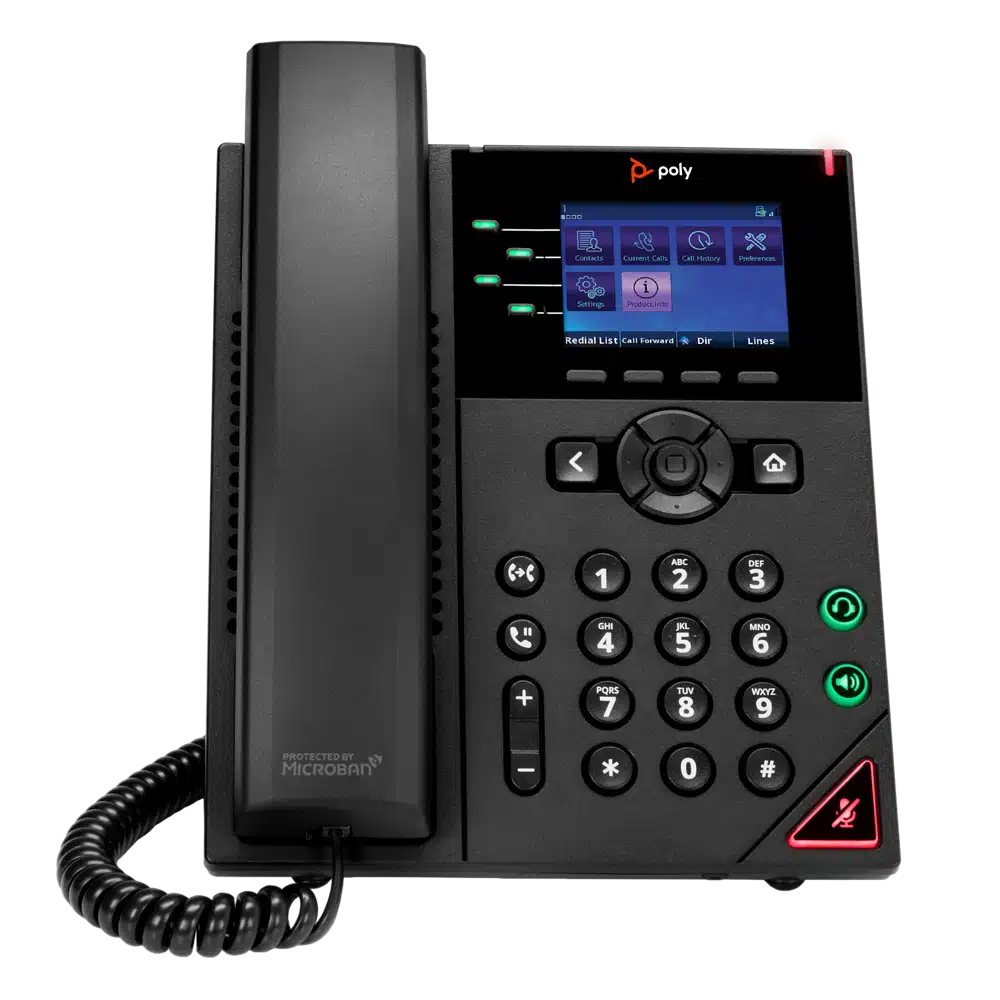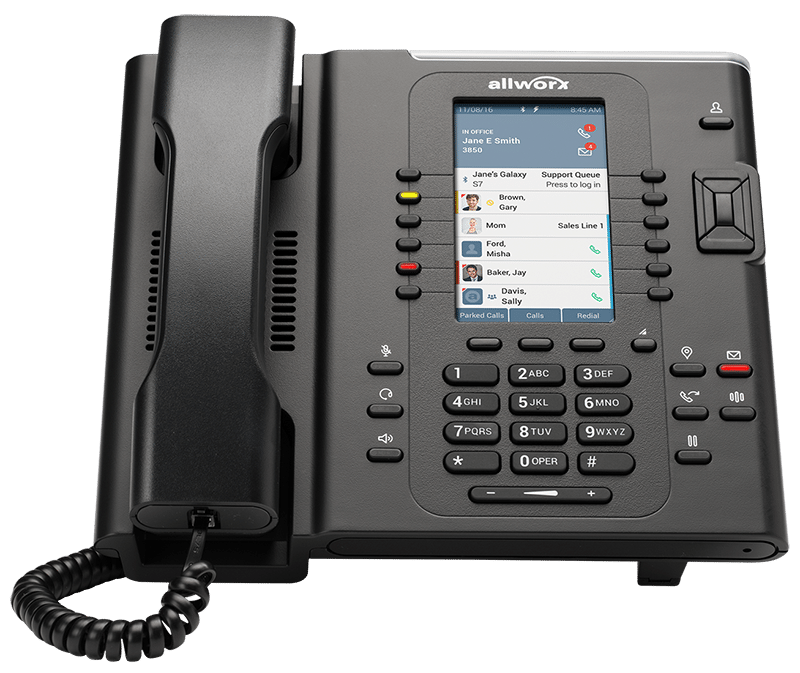Finding the right communications solution for your small business can be difficult. VoIP phone systems are a great choice for every business, as they allow for amazing features that facilitate expandability, flexibility, and efficiency. If your business is researching VoIP, maybe you’re wondering which is better – on-premise or hosted. Both types of VoIP options have their pros and cons, which might make one more or less ideal for your business. Let’s take a look at the differences between hosted and on-premise VoIP.
But First, What Is VoIP?
You may or may not be familiar with voice over internet protocol – “VoIP” – phone systems. VoIP operates differently from a typical landline phone because it makes and receives calls via internet connection. These phone systems are especially great for businesses, as they offer a lot of services and customizability that can increase efficiency. VoIP is easy to set up, modify, and expand. With VoIP, your business will have access to features like the queue, automatic call distribution (ACD), “park” buttons, increased reach and expandability, and much more.

Hosted VoIP
Hosted VoIP, also known as, “Unified Communications,” is one form of VoIP that your company can install for its phone system. With a hosted VoIP system, a larger company, like RingCentral or 8×8, hosts the VoIP server. These are cloud-based systems, so everything is managed by an external company. The end user simply plugs in the phone and can unlock all of the VoIP features offered. There is less maintenance and upkeep with hosted phones. The hosting facility will oversee, maintain, and backup any hosted VoIP systems. Hosted VoIP also usually includes some telephone conferencing solutions and faxing. Companies may prefer hosted VoIP over on-premise VoIP because it requires less maintenance and is very hands-off.
On-Premise VoIP
On-premise VoIP is another type of VoIP phone system that your business might choose to install. These are typically installed locally, so the VoIP hardware is actually located inside of the office space. On-premise is not as new as hosted VoIP communications but is an amazing option for many businesses. Companies who have managed IT services will typically choose to use on-premise VoIP, as a lot of IT support will offer VoIP management as a service. On-premise VoIP offers a lot more expandability and full utilization of VoIP’s best features. Your company will be able to choose what it needs for the most optimal functionality and efficiency.

Allworx created their first VoIP system in 2003 and started out as an engineering consulting firm for blue-chip clients such as GE, Kodak and Emerson.
A potential downside to VoIP systems is the higher upstart cost. Customers will have to purchase the hardware necessary to install VoIP, including physical phones, equipment, licenses, and more. This one-time cost is one of the negative things that comes with on-premise VoIP but in the long run, it’ll actually benefit your business. Even with higher startup prices, the monthly maintenance cost is far lower, since the customer just has to pay for usage rather than all of the hardware mentioned above. Here at Computero, we provide services for on-premise VoIP systems. We charge a monthly fee per phone, which is about half of what a customer who uses unified communications would pay. Month to month, having on-premise VoIP through our partner Allworx will be a lot cheaper than hosted communications offered by companies such as RingCentral or 8×8. In the long term, businesses will experience a higher return on their investment.
Additionally, coupled with other managed IT services that might accompany VoIP, your company will actually be receiving the highest quality support for a great value. And whenever you need help, your managed IT service provider will be there to assist you.
Hosted vs. On-Premise VoIP | Which one should you choose?
Why choose one type of VoIP phone system over the other? Hosted VoIP is a great option for any size business and allows for an easy setup. The cloud-based system works well for both in-person and remote workers, since it can be accessed anywhere and at any time. However, since these systems are owned by an external organization, it’s more difficult to control or customize your own system. You always have to rely on the outside provider, like RingCentral or 8×8, so if they are experiencing technical issues, it’s likely that the same would happen for you. Additionally, poor connection can cause poor performance and lower call quality.
On the other hand, on-premise systems give your company full capability to customize and control your VoIP phone system any way you want. It’s a wonderful choice for any size business as well. VoIP generally allows for easy scalability; if you foresee expansion within your business, on-premise VoIP can easily accommodate for it. You won’t have to pay a costly monthly subscription fee for these services; in fact, the monthly costs for on-premise VoIP is typically lower than it is for hosted VoIP. Your business might require an in-house IT department or a managed IT service provider to make the installation and maintenance of on-premise VoIP systems a lot simpler. With your managed IT service provider, like Computero, having on-premise VoIP is the far more simpler and cost effective option.
Comparing Costs
As mentioned before, there’s definitely a cost difference between hosted and on-premise VoIP. The upfront cost of on-premise VoIP is certainly higher than it would be for unified communications. When installing on-premise VoIP, your business will need to pay for devices and any necessary equipment. For hosted VoIP, the external provider will take care of these issues, and there will be a lower or no initial cost. However, in the long-run, on-premise VoIP will have a greater return on investment. The monthly costs for on-premise VoIP is usually half that of hosted VoIP, making it a more feasible option for many businesses who are looking one or two years into the future.
Computero for Your VoIP Phone System
In addition to a lot of the IT services and technical support we provide, Computero can help you set up and manage your new VoIP phone system. We’ve done installations for countless clients and helped them customize their VoIP phones to fit their needs. This includes implementing many features like auto-attendant, having a call queue and more.At Computero, we trust AllWorx for all of our VoIP communications. They have reliable and sophisticated phone systems that’ve been proven to be fantastic options for the various SMBs that we work with. Their system can support anywhere from 5-10 phones and have up to 250 users on one server. Even if your employees are working remotely or have a hybrid work schedule, they can still use Allworx. Systems like Allworx will help your business save money and be more productive, efficient, and reliable. Computero knows that AllWorx is the perfect solution for small business phone systems. If your business is looking for VoIP phone systems, contact us today.





0 Comments